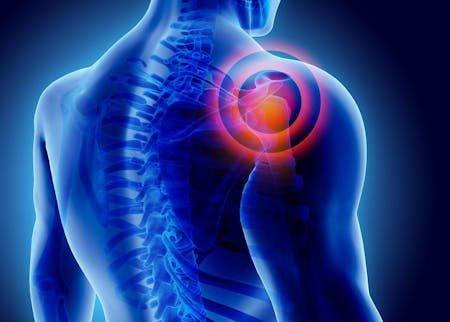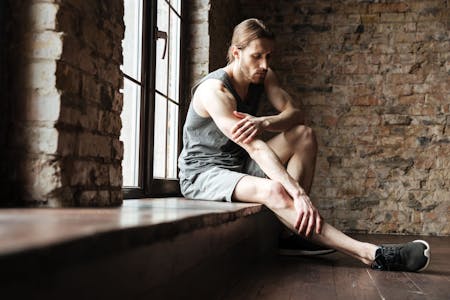-
Joint Disorders
Joint pain is discomfort or pain in any part of where two or more bones meet to form a joint including cartilage and bone within the joint or ligaments, tendons, muscles and bursae surrounding the joint. It is usually caused by damage resulting from normal wear and tear.
Common conditions that cause joint pain include:
- Arthritis (Arthralgia) - Osteoarthritis (OA), Rheumatoid Arthritis (RA)
- Muscle Strain - over-stretching or tearing of a muscle
- Tendon Strain - over-stretching or tearing of a tendon (tissue connecting muscle to bone)
- Sprains - over-stretching or tearing of a ligament (band of tissues that connect two bones)
- Fibromyalgia - an autoimmune disorder causing widespread muscle pain and tenderness
- Bursitis - inflammation of the fluid-filled sacs that protect the joint
If you are suffering with any of the above-mentioned signs or symptoms in your joints, chances are, our physical therapists can help.
Most joint pain can be treated non-surgically with low-impact activities, ice packs, over-the-counter pain medications and physical therapy. However, you should see a physician if you have these symptoms:
- Pain accompanied by redness or swelling
- Warmth around the joint
- Normal, everyday activities are painful or becoming more difficult to do
The following symptoms are serious and require immediate medical attention:
- Intense pain
- Joint deformity
- Sudden swelling
- Unable to move the joint
- A fever of 102°F (39°C) or higher
-
Muscle Disorders (Myopathy)
Your body contains more than 600 muscles. They are made up of special cells called muscle fibers. Muscles contract and move the other parts of the body, maintain posture and body position, move substances inside the body and generate body heat.
There are three types of muscle that help your body work and move:
- Cardiac Muscle (Heart muscles)
- Smooth Muscles (Visceral internal organ muscles that are sometimes also called involuntary muscles)
- Skeletal Muscles (About 700 striated muscles that attach to the bones skeletal system)
Muscle disorders are known as myopathies. The main symptom is muscle weakness and fatigue due to dysfunction (abnormality) of muscle fiber. Muscle disorders can also cause a variety of other symptoms including pain, muscle cramps, stiffness, spasms and even paralysis.
The most common causes of muscle disorders include sprains or strains, cramps or tendinitis. They can also be caused by genetic disorders (e.g., Muscular Dystrophy), some cancers, inflammation (e.g., myositis), nerve diseases, infections, certain medications and exposure to hazardous materials.
-
Conditions We Rehabilitate
Joint Injuries / Disorders:
- Osteoarthritis (OA)
- Dislocations
- Ligament Injury
Inflammatory Conditions:
- Rheumatoid Arthritis (RA)
- Carpal Tunnel Syndrome
- Epicondylitis (tennis/golfer's elbow)
- Plantar Fasciitis
- Bursitis
- Myositis Ossificans (bone tissue that forms mainly in large skeletal muscles such as quadriceps, brachialis & thigh adductor muscles)
Tendon/Ligament Disorders:
- Sprains
- Strains
- Tendonitis
- Tendon Ruptures
Muscle Injury / Disorders:
- Muscle Bruises, Contusions
- Muscle Ruptures
- Muscle Contractures
- Muscle Spasms
- Myositis (Inflammatory Muscle Disorders)
- Primary Muscle Diseases Such as Muscular Dystrophy (MD), Polymyositis (PM) and Myasthenia gravis (MG)
- Secondary Muscle Diseases Including Infectious Diseases, Endocrine Disorders, Metabolic Disorders, Immunological Conditions and Vascular Diseases
Neurological Injury / Disorders:
- Stroke/CVA
- Bulging/ Herniated/ Prolapsed Disk
- Ruptured Disk
- Crush Injuries/Neuritis
- Fibromyalgia
- Amyotrophic Lateral Sclerosis (Lou Gehrig’s Disease)
- Multiple Sclerosis
- Charcot-Marie-Tooth Disease
- Acquired Peripheral Neuropathy
- Multifocal Motor Neuropathy
- Cerebral Palsy (CP)
- Foot Drop
- Nerve Root Injuries
- Local Compression or Damage to the Peroneal Nerve as it Passes Across the Fibula Below the Knee
Physical Therapy for Joint and Muscle Disorders
Physical therapy for joint and muscle disorders are designed to help to increase range of motion (ROM), flexibility and strength while reducing pain and weakness in the muscles and joints. Treatment may include:
- Post-Surgical Orthopedic Rehabilitation
- Acute, Chronic Rehab
- Joint Replacement Rehab
- Spine Rehabilitation/Core Stabilization
- Sports Injury Rehab
- Hydrotherapy
- Balance and Posture Training
- Industry Rehabilitation
- Stretching, Strengthening, Toning and Stability Exercises
- Personal Training/Individual Work Out Programs
- Corporate Fitness Programs
Muscle & Joint Physical Therapy
We Can Help!
If you are suffering from joint or muscle pain, let us help you! Call (515) 257-7915 or click here to schedule an appointment with us.


